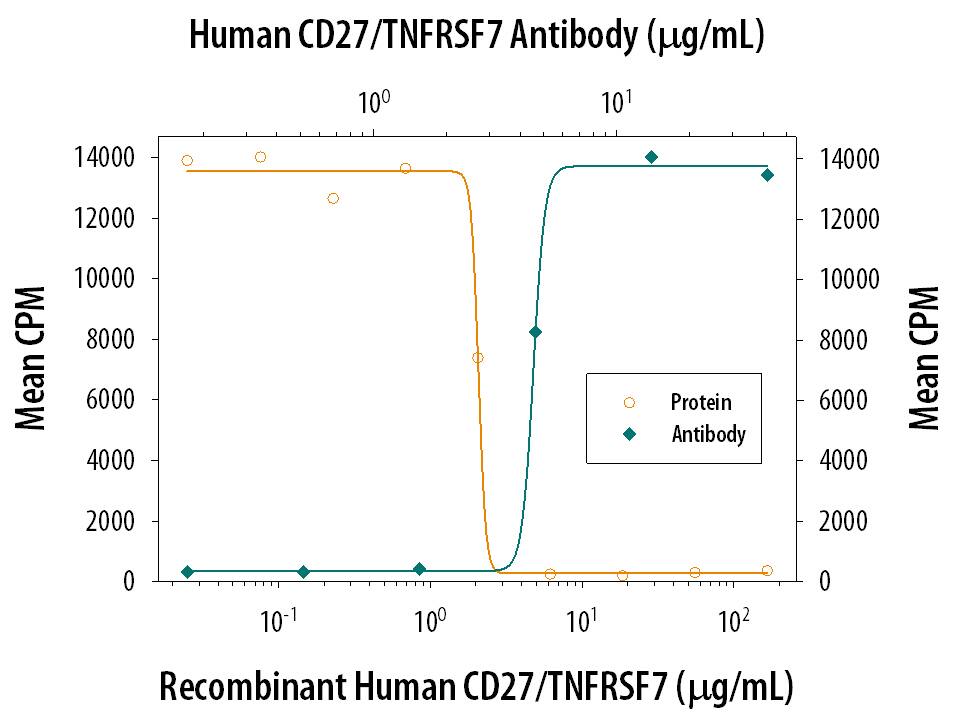Human CD27/TNFRSF7 Antibody
R&D Systems, part of Bio-Techne | Catalog # MAB382


Key Product Details
Species Reactivity
Validated:
Cited:
Applications
Validated:
Cited:
Label
Antibody Source
Product Specifications
Immunogen
Thr21-Ile192
Accession # P26842
Specificity
Clonality
Host
Isotype
Endotoxin Level
Scientific Data Images for Human CD27/TNFRSF7 Antibody
CD27/TNFRSF7 Inhibition of CD27 Ligand/TNFSF7-dependent Cell Proliferation and Neutralization by Human CD27/TNFRSF7 Antibody.
In the presence of sub-optimal amounts of Mouse CD3e Monoclonal Anti-body (Catalog # MAB484) and Recombinant Mouse CD27 Ligand (10 µg/mL, Catalog # 783-CL), Recombinant Human CD27 Fc Chimera (Catalog # 382-CD) inhibits proliferation in mouse splenic T cells in a dose-dependent manner (orange line). Under these conditions, inhibition of proliferation elicited by Recombinant Human CD27 Fc Chimera (3 µg/mL) is neutralized (green line) by increasing concentrations of Mouse Anti-Human CD27 Monoclonal Antibody (Catalog # MAB382). The ND50 is typically 0.2-0.4 µg/mL.Applications for Human CD27/TNFRSF7 Antibody
CyTOF-ready
Flow Cytometry
Sample: Human whole blood lymphocytes
Western Blot
Sample: Recombinant Human CD27/TNFRSF7 Fc Chimera (Catalog # 382-CD)
Neutralization
Formulation, Preparation, and Storage
Purification
Reconstitution
Formulation
Shipping
Stability & Storage
- 12 months from date of receipt, -20 to -70 °C as supplied.
- 1 month, 2 to 8 °C under sterile conditions after reconstitution.
- 6 months, -20 to -70 °C under sterile conditions after reconstitution.
Background: CD27/TNFRSF7
Human CD27 is a lymphocyte-specific member of the TNF receptor superfamily. CD27 is expressed on a subset of human thymocytes and on the majority of mature T cells. CD27 expression is up-regulated after TCR stimulation. Within the CD4+ compartment, it is preferentially expressed on CD45RA+ cells. In contrast, it is preferentially expressed on CD45RO+ cells in the CD8+ compartment. CD27 also appears to be a potential marker for memory B cells. It exists as both a disulfide‑linked dimer on the cell surface and as a soluble protein found in serum. Human CD27 is a 260 amino acid (aa) protein with a 20 aa signal, a 173 aa extracellular domain, a 20 aa transmembrane domain, and a 47 aa cytoplasmic domain. The ligand for CD27 is CD70. CD70 is expressed on thymic stromal cells and a small subset of activated T cells. Additionally a subset of activated B cells express CD70. The CD27/CD70 interaction appears to be a weak costimulatory pathway involved in T cell and B cell immune response. CD27/CD70 interactions may be more involved in controlling the expansion phase of an immune response. This would be in contrast to B7/CD28 interactions, which are important for the activation phase of immune responses.
References
- Camerini, D. et al. (1991) J. Immunol. 147:3165.
- Loenen, W.A. et al. (1992) J. Immunol. 149:3937.
- Lens, S.M.A. et al. (1998) Sem. Immunol. 10:491.
Alternate Names
Gene Symbol
UniProt
Additional CD27/TNFRSF7 Products
Product Documents for Human CD27/TNFRSF7 Antibody
Product Specific Notices for Human CD27/TNFRSF7 Antibody
For research use only